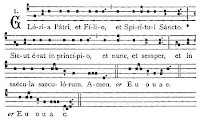Glory Be To The Father Lyrics
1 Glory be to God the Father,
glory be to God the Son,
glory be to God the Spirit,
God Almighty, Three in One!
Hallelujah! Hallelujah!
Glory be to him alone.
2 Glory be to him who loved us,
washed us from all sin and stain!
glory be to him who bought us,
made us kings with him to reign!
Hallelujah! Hallelujah!
Praise the Lamb that once was slain!
3 Glory to the King of angels,
glory to the church’s King,
glory to the King of nations;
heav’n and earth, your praises bring!
Hallelujah! Hallelujah!
To the King of glory sing!
4 “Glory, blessing, praise eternal!”
Thus the choir of angels sings.
“Honor, glory, power, dominion!”
Thus its praise creation brings.
Hallelujah! Hallelujah!
Praise the mighty King of kings!
For more lyrics and stories of popular hymns visit popular and old hymns history and lyrics.
Below are even more must-reads on hymns history and lyrics: –
The Old Rugged Cross Hymn History and Lyrics
I Sing the Might Power of God Hymn
Who Composed Glory Be To The Father Hymn?
ONE of the most universally accepted forms of worship among Protestants, who would praise the Triune God in song, is the ancient “Gloria Patri.”
This is strictly within the meaning of the term, a doxology, for a doxology is an alleluia or other expression of praise to the Three Persons of the Holy Trinity.
“Glory be to the Father, and to the Son, and to the Holy Ghost” expresses the fundamental doctrine of the Apostles Creed, and at the same time utters worshipful praise to God.
The story of the exact origin of the “Gloria Patri” is not known, though it is thought by many hymnologists to have come to us from the apostolic age.
The coming of Christ as a babe in Bethlehem was heralded by a hymn of the angels in the first Christmas Gloria: “Glory to God in the highest, and on earth peace, goodwill toward men.”
After the Last Supper with the Saviour, the apostles sang a hymn and went out, as it is recorded in the gospel.
Hymn-singing was one of the peculiar customs of the early Christians observed by secular writers of that age.
There is inspiration to us in the thought that the Christians of this day make such frequent use of the hymn to the Trinity, sung by Christians in the apostolic age.
It is said that on May 26, A. D. 735, when his death was approaching, The Venerable Bede, the most eminent sacred scholar of his age, asked his friends to carry him to that part of the room where he usually prayed; and there he sang the “Gloria Patri”; and when at last he had sung, “World without end, Amen,” he died.

Glory Be to the Father YouTube Video
Gloria In Excelsis Lyrics and Story
